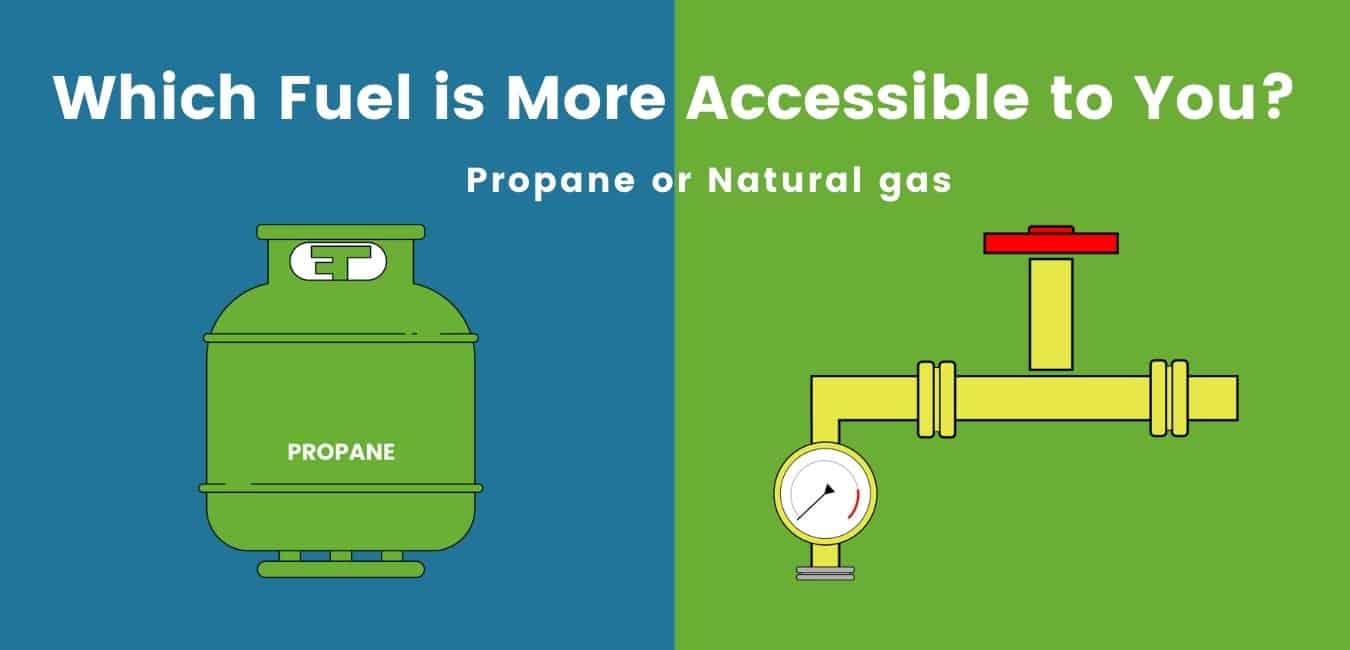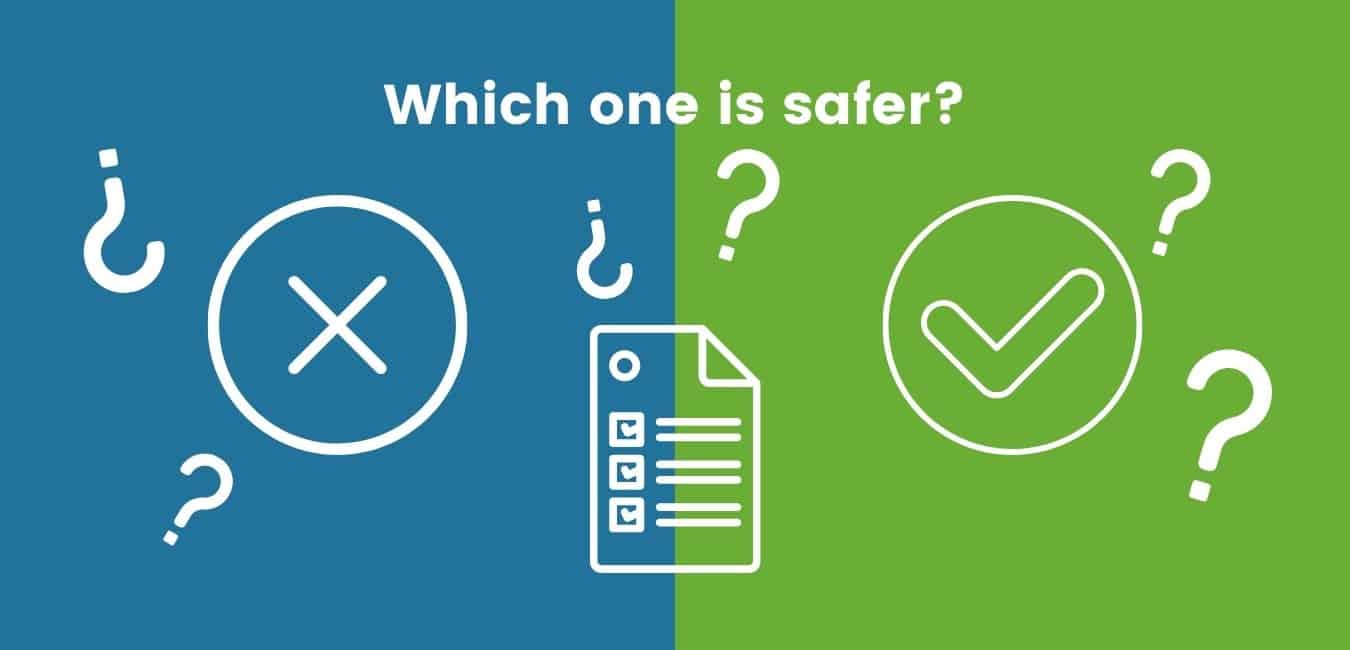Last Updated on October 19, 2022 by Manager Access

A propane or natural gas generator is an excellent choice for emergency backup power in the event of a power outage.
Natural gas is a fossil fuel that has been used for decades. It is often found in deep underground reservoirs. It’s colorless, odorless, and more than 70% of it is made up of methane.
Propane is extracted from natural gas. It’s actually a byproduct of natural gas processing and crude oil refinement. It’s compressed into liquid form and stored in portable tanks.
If you’re considering using either, it’s crucial that you know the differences between the two fuels and which one will work best with your needs before making a purchase.
Here are some of the most important factors to consider when deciding which fuel type will be best for you:
Which Fuel is More Accessible to You: Propane or Gas?

The biggest difference between natural gas and propane is their delivery method.
Your location will dictate what kind of fuel you have access to and how much it costs.
Propane often comes in liquid form, stored in heavy tanks that need to be refilled periodically. On the other hand, natural gas is delivered to homes via pipelines, which means that it’s available 24/7.
Propane tanks require refills but also have the advantage of getting around where there aren’t any gas lines. This makes propane very convenient for people who live outside of urban centers where natural gas isn’t available.
On the other hand, natural gas has the advantage of being accessible at all times because it’s piped directly into people’s homes.
Which Type of Generator Runs the Longest: Propane or Natural Gas Generators?

Generator run times will depend on fuel supply so as long as you have enough supply of natural gas or propane, your generator will keep running indefinitely.
You don’t need to worry about running out of natural gas because it flows off of a meter and into your home through your gas line whenever you need it.
However, generators need sufficient pressure coming from the gas lines for them to work. So if for some reason, your gas line loses pressure, then your generator may stop working.
With propane, you won’t have that problem. Depending on the power load, a 500-gallon propane tank can keep a generator running continuously for 1 to 2 weeks. But you need to make sure that you’re well-supplied with propane at all times.
If you run out of propane during a power outage or storm, then it might be challenging to get your tank refilled, depending on your area.
Which one is safer: Liquid Propane or Natural Gas?

Even though propane is heavier than natural gas, it’s a little safer. Natural gas is lighter and dissipates more quickly when released into the atmosphere, still it’s difficult to identify and fix leaks because of all the infrastructure that comes with gas lines.
If gas lines are not maintained, they can cause leaks and accidents. Since propane is stored in a tank versus an underground pipe system, accidents are less likely. And even when it does leak, it will have less of an impact compared to natural gas.
We all know that gas leaks are a serious issue because you can’t smell them by themselves. So to detect leaks (in case they happen), companies add chemicals like ethyl mercaptan, which has a very unpleasant smell, to both propane and natural gas.
Check with your local utility company if you have access to natural gas lines in your area and if so, check if they’re properly maintained.
Are Natural Gas Generators Cheaper than Propane Generators?

Let’s start with the cost per gallon for each type of fuel. Currently, natural gas costs around $4 per 1,000 cubic feet which compares to about 12 gallons. That computes to just around $0.34 per gallon of natural gas.
Propane, on the other hand, costs around $2.38 per gallon – roughly seven times more than natural gas.
Natural gas may seem like the winner here, but let’s take a look at efficiency.
Propane has a higher density and has roughly twice the amount of energy as natural gas, which means you’ll use less of it to power the same appliances.
Propane is more efficient because it releases 2,516 BTUs (British Thermal Unit) per cubic foot. Natural gas only offers 1,030 BTUs per cubic foot.
So even though natural gas costs less per gallon, you’ll need to use more of it compared to propane.
In addition, since natural gas is delivered to your home via pipeline, you need to have the infrastructure in place to accommodate it. If you don’t, then you’ll find yourself paying for high installation costs as well as maintenance.
With propane, there’s no need for any of that since they come in portable canisters that can be refilled or delivered to your home.
Now let’s talk about the cost of generators for each type. For natural gas generators, they cost anywhere between $1,900 to $5,000. For propane generators, expect to get them for around $500 to $6,000.
If your home is already connected to a gas line or if you don’t mind making that upfront investment, natural gas may be the cheaper option long term.
If not, propane is the best choice since not only is it more accessible and convenient, but it also packs more energy per gallon.
Propane Vs Natural Gas Pros and Cons
| Accessibility | Run time | Safety | Cost | |
| Propane |
|
|
|
|
| Natural Gas |
|
|
|
|
Best 3 Propane Generators to Buy in 2021
The best thing about propane generators is that most of them are dual-fuel generators, which means they can run on either propane or gasoline, giving you more flexibility compared to natural gas.
To help you in your journey, here are my top picks for propane generators:
DuroMax XP4850EH Generator

DuroMax comes from a leading engine manufacturer. Their 210cc OHV is designed to provide maximum power and efficiency in any application, making it perfect for those who need versatility from their equipment.
If you’re looking for an all-around dual fuel generator that can use both gasoline and propane, DuroMax XP4850EH is one of the best. With 4,850 starting watts and 3,850 running watts, it’s tough enough for just about anything you can throw at it – from lights or your refrigerator to high amp power tools.
Westinghouse WGen3600DF Generator

Westinghouse is one of the leading brands when it comes to portable generators. You can’t go wrong with one of their dual fuel generators.
With 4650W starting wattage, the Westinghouse WGen3600DF is the perfect solution for generating enough power to keep your home comfortable and productive during an emergency or power outage.
It skillfully combines the convenience of an electric start with the versatility of running on either gas or propane. Switching between them is as easy as flipping a switch.
Pulsar G12KBN Generator

Pulsar is a brand with many different generators, ranging from 1kW to 10 kW. These include some dual fuel and RV-ready models that will keep you powered up on the go!
The G12KBN is the perfect generator for those seeking a reliable and powerful backup during power outages. With 10800W (propane) / 12800W (gasoline) starting wattage, this beast can support major appliances and comes with convenient drop-down handles as well as 10” never-flat wheels that make it portable enough to store in any tight space.
Wrapping Up
When it comes to choosing between propane and natural gas generators, there are many factors that can determine the best choice for your home.
I hope this guide has helped you understand the difference between natural gas and propane generators and given you a fair comparison of some factors that can help you determine which one is the better choice for you.

Scott Krager purchased generatorgrid.com in the summer of 2020 and quickly began to buy every generator under the sun! He currently has over a dozen generators and the number is growing quickly. He lives in Portland, OR near his family and friends.
GeneratorGrid.com is an independent review business. I am not affiliated with any manufacturers and do not accept paid reviews. When you buy through my links, I may earn a commission which helps me purchase more generators for testing. - Scott Krager


If I have a duel fuel Propane/Gasoline generator, can I break it in using propane?
And will the piston rings seat properly using propane?
Good article, keep up the good work!
I do have a question though. I know how to break in a duel fuel generator on gasoline, but if you have a brand new duel fuel generator can it be broken in on propane instead of gasoline and still seat the piston rings properly?
Or do I need to break it in on gasoline first then switch over to propane?